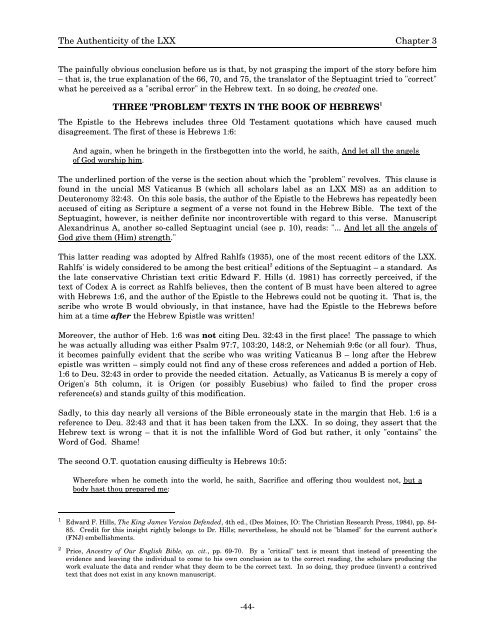The Septuagint: A Critical Analysis - Christian Mission Connection
The Septuagint: A Critical Analysis - Christian Mission Connection
The Septuagint: A Critical Analysis - Christian Mission Connection
Create successful ePaper yourself
Turn your PDF publications into a flip-book with our unique Google optimized e-Paper software.
<strong>The</strong> Authenticity of the LXX Chapter 3<br />
<strong>The</strong> painfully obvious conclusion before us is that, by not grasping the import of the story before him<br />
– that is, the true explanation of the 66, 70, and 75, the translator of the <strong>Septuagint</strong> tried to "correct"<br />
what he perceived as a "scribal error" in the Hebrew text. In so doing, he created o n e .<br />
THREE "PROBLEM" TEXTS IN THE BOOK OF HEBREWS 1<br />
<strong>The</strong> Epistle to the Hebrews includes three Old Testament quotations which h a v e c a u s e d m u c h<br />
disagreement. <strong>The</strong> first of these is Hebrews 1:6:<br />
And again, when he bringeth in the firstbegotten into the world, he saith, And let all the angels<br />
of God worship him.<br />
<strong>The</strong> underlined portion of the verse is the section about which the "problem" revolves. This clause is<br />
found in the uncial MS Vaticanus B (which all scholars label as an LXX MS) as an addition to<br />
Deuteronomy 32:43. On this sole basis, the author of the Epistle to the Hebrews has repeatedly been<br />
accused of citing as Scripture a segment of a verse not found in the Hebrew Bible. <strong>The</strong> text of the<br />
<strong>Septuagint</strong>, however, is neither definite nor incontrovertible with regard to this verse. Manuscript<br />
Alexandrinus A, another so - called <strong>Septuagint</strong> uncial (see p. 10), reads: "... And let all the angels of<br />
God give them (Him) strength ."<br />
This latter reading was adopted by Alfred Rahlfs (1935), one of the most recent editors of the LXX.<br />
Rahlfs' is widely considered to be among the best critical 2 editions of the <strong>Septuagint</strong> – a standard. As<br />
th e late conservative <strong>Christian</strong> text critic Edward F. Hills (d. 1981) has correctly perceived, if the<br />
text of Codex A is correct as Rahlfs believes, then the content of B must have been altered to agree<br />
with Hebrews 1:6, and the author of the Epistle to the Hebrews could not be quoting it. That is, the<br />
scribe who wrote B would obviously, in that instance, have had the Epistle to the Hebrews before<br />
him at a time after the Hebrew Epistle was written!<br />
Moreover, the author of Heb. 1:6 was not citing Deu. 32:43 in the first place! <strong>The</strong> passage to which<br />
he was actually alluding was either Psalm 97:7, 103:20, 148:2, or Nehemiah 9:6c (or all four). Thus,<br />
it becomes painfully evident that the scribe who was writing Vaticanus B – l o n g a f t e r t h e H e b r e w<br />
epistle was written – s i m p l y c o u l d n o t f i n d a n y o f t h e s e c r o s s r e f e r e n c e s a n d a d d e d a p o r t i o n o f H e b .<br />
1:6 to Deu. 32:43 in order to provide the needed citation. Actually, as Vaticanus B is merely a copy of<br />
Origen's 5th column, it is Origen (or possibly Eusebius) who fail e d t o f i n d t h e p r o p e r c r o s s<br />
reference(s) and stands guilty of this modification.<br />
Sadly, to this day nearly all versions of the Bible erroneously state in the margin that Heb. 1:6 is a<br />
reference to Deu. 32:43 and that it has been taken from the LXX. In so doing, they assert that the<br />
H e b r e w t e x t i s w r o n g – that it is not the infallible Word of God but rather, it only "contains" the<br />
W o r d o f G o d . S h a m e !<br />
<strong>The</strong> second O.T. quotation causing difficulty is Hebrews 10:5:<br />
Wherefore when he cometh into the world, he saith, Sacrifice and offering thou wouldest not, but a<br />
body hast thou prepared me:<br />
1 Edward F. Hills, <strong>The</strong> King James Version Defended, 4th ed., (Des Moines, IO: <strong>The</strong> <strong>Christian</strong> Research Press, 1984), pp. 84-<br />
85. Credit for this insight rightly belongs to Dr. Hills; nevertheless, he should not be "blamed" for the current author's<br />
(FNJ) embellishments.<br />
2 P r i c e , Ancestry of Our English Bible, op. cit., pp. 69-70. By a "critical" text is meant that instead of presenting the<br />
evidence and leaving the individual to come to his own conclusion as to the correct reading, the scholars producing the<br />
work evaluate the data and render what they deem to be the correct text. In so doing, they produce (invent) a contrived<br />
text that does not exist in any known manuscript.<br />
- 44-


